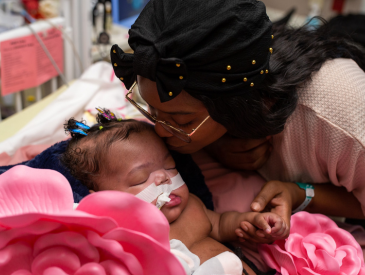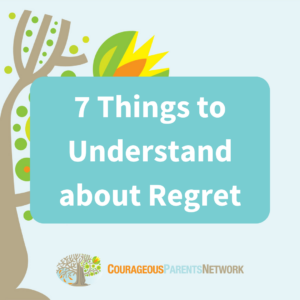Guilt and Regret
Raising children involves all kinds of decision-making. Some decisions are relatively easy to make, particularly when the consequences seem obvious and minor. Other decisions are more complicated. Some decisions must be made quickly; in other circumstances we are allowed some time. When the stakes seem especially high, as they often do in children with medical complexity, it is not unusual to be fearful of the possible consequences of your choices and of how you will feel having made those choices.

Your Team:
A member of the clergy who is responsible for the religious needs of an organization and/or its constituents.
An interdisciplinary specialist who helps manage the medical, social and emotional challenges of complex and/or long-term care.
A specialist whose aim is to improve the quality of life of their patients over the course of their illness regardless of stage, by relieving pain and other symptoms of that illness.
A medical professional who practices general medicine.
A mental health professional who uses therapy and other strategies to support coping and adjustment and treat concerns regarding social, emotional, or behavioral functioning.
A trained professional who works with people, groups and communities to help them better their lives.
A trained person who uses art to address the physical, emotional, cognitive, and social needs of people.
Your child’s primary physician or another clinician who knows your child and family can be a good resource for talking through decisions. Palliative care and complex care clinicians can guide you in understanding how certain decisions might affect other aspects of your child’s health and well-being. A psychologist, social worker, chaplain or other therapist can help you sort through your feelings about the decision, including hopes and fears.
There are different kinds of regret associated with decisions. Feelings of regret may arise at different times, and whether or not the decision feels important at the time it is, or was, made. This is all very normal.
Sometimes we question a decision, and sometimes we wish that a different decision had been made. “Decisional regret” is something experienced when realizing or imagining that a different outcome might have occurred if you had made another choice. You may feel decisional regret if you choose a path of care that doesn’t produce the results you hoped for.
There is no time limit on decisional regret. It may occur almost immediately, or even years after decisions have been made. If (or when) we experience decisional regret, it is with a sense of loss for what might have or could have been. It is not uncommon to wonder if you did the right thing, or not enough, or too much. Conversations with professionals can help you process your feelings about this.
The fear of making the wrong decision in the (near) future can produce “anticipated (or anticipatory) regret.” This is fear of being unable to cope with any consequences that might occur, such as unintentionally causing your child’s condition to worsen. It is also the fear that perhaps a “better” option will appear in the future and will be unavailable because of prior decisions.
The fear of making a choice can be paralyzing. As challenging as decision-making can be, though, it also is empowering. The clearer your goals for your child, the better prepared you will feel to work with clinicians to make the critical decisions. Be sure to revisit your goals from time to time, especially if there are changes in your child’s baseline.
Know, too, that sometimes there simply are no good choices, and you must make a decision nevertheless. Remember that you are doing the best you can with the information you have at the time. Believing that you have the necessary information is thus very important. If you are unsure, speak with members of your team. If you don’t understand the information or feel uncomfortable, ask for additional help to get clarity.
And know that some regret and perhaps some guilt, is almost inevitable. You may find it helpful to think of an undesired outcome as a disappointment rather than a regret. Be compassionate with yourself.
The section on Decision-Making presents helpful ways to manage the decisions you will need to make.
– Jazmyne, parent of Crimson
Related Resources
-
 A genetic diagnosis: I had to get over the guilt of feeling “is this my fault?”video
A genetic diagnosis: I had to get over the guilt of feeling “is this my fault?”video -
 Pediatric Disease: My Genes, My Guilt.video
Pediatric Disease: My Genes, My Guilt.video -
![Regret re decision-making about interventions: “If we as parents center our child’s experience [not our fear of guilt], with every choice, I don’t see how we can go wrong.”](https://img.youtube.com/vi/3lskDTij76o/maxresdefault.jpg) Regret re decision-making about interventions: “If we as parents center our child’s experience [not our fear of guilt], with every choice, I don’t see how we can go wrong.”video
Regret re decision-making about interventions: “If we as parents center our child’s experience [not our fear of guilt], with every choice, I don’t see how we can go wrong.”video -
 Decision-making about a trach for my son: palliative care appreciates that it can be a loving decision not to do everything.video
Decision-making about a trach for my son: palliative care appreciates that it can be a loving decision not to do everything.video -
 7 Things to Understand About RegretBLOG
7 Things to Understand About RegretBLOG -
 Grief, Guilt, and GratitudeBLOG
Grief, Guilt, and GratitudeBLOG